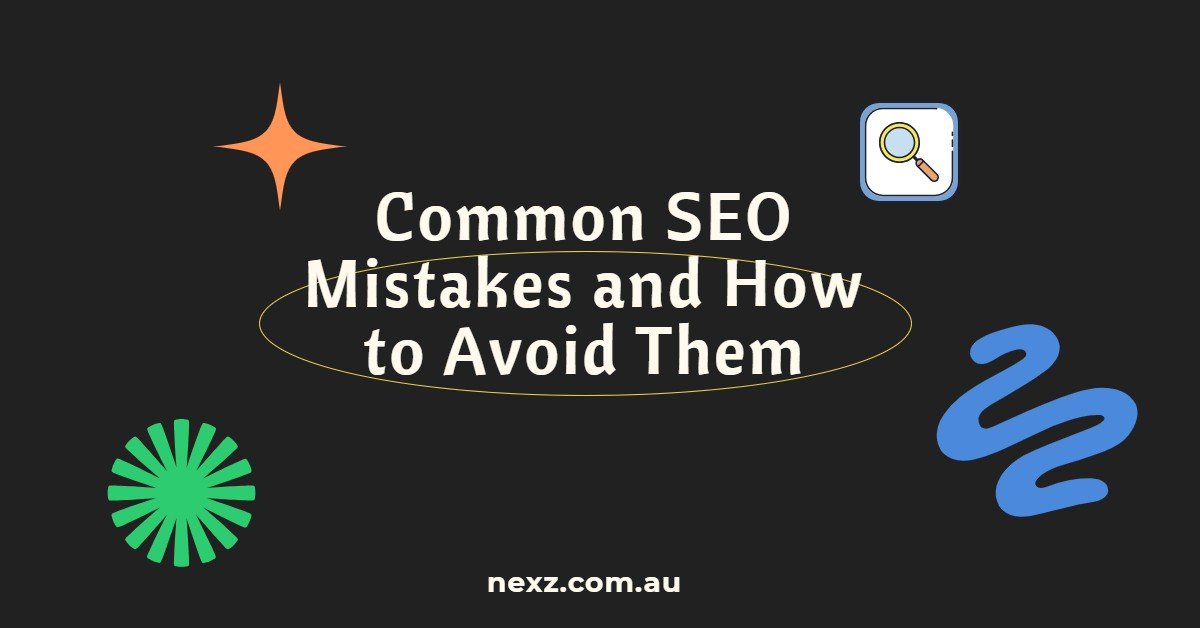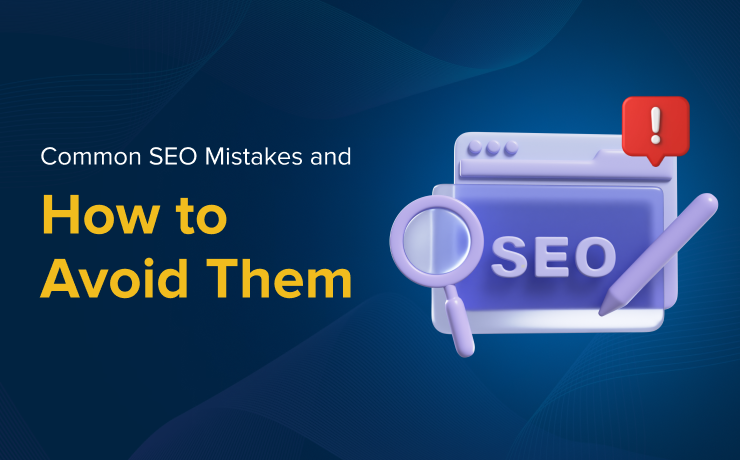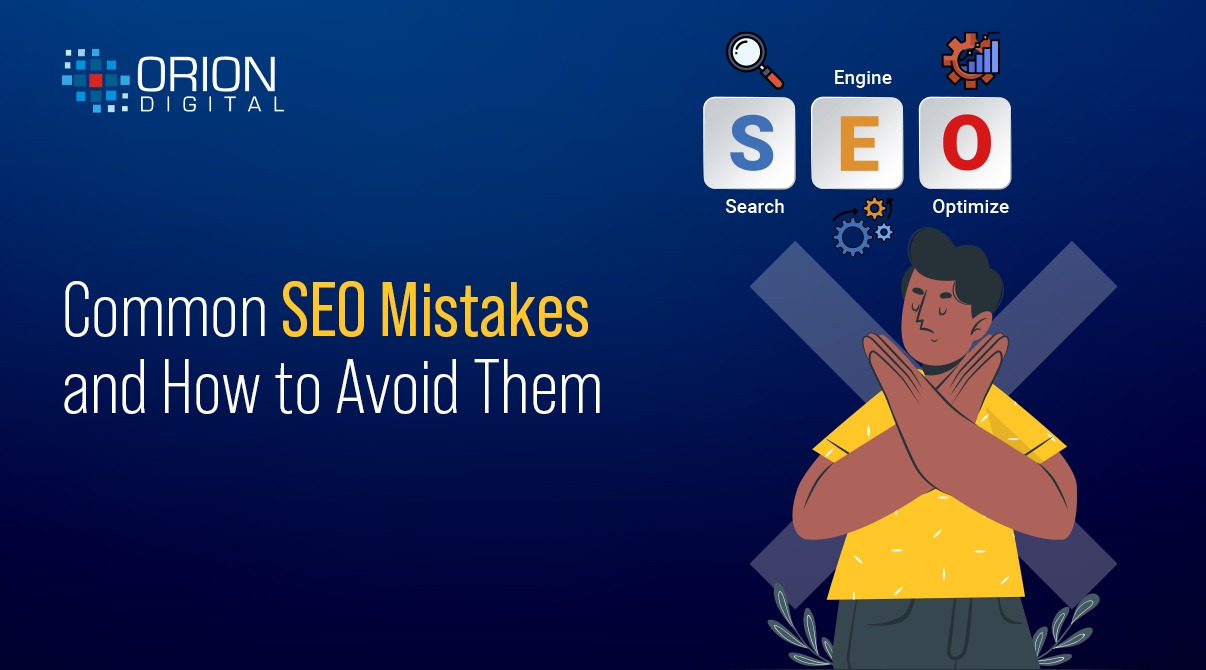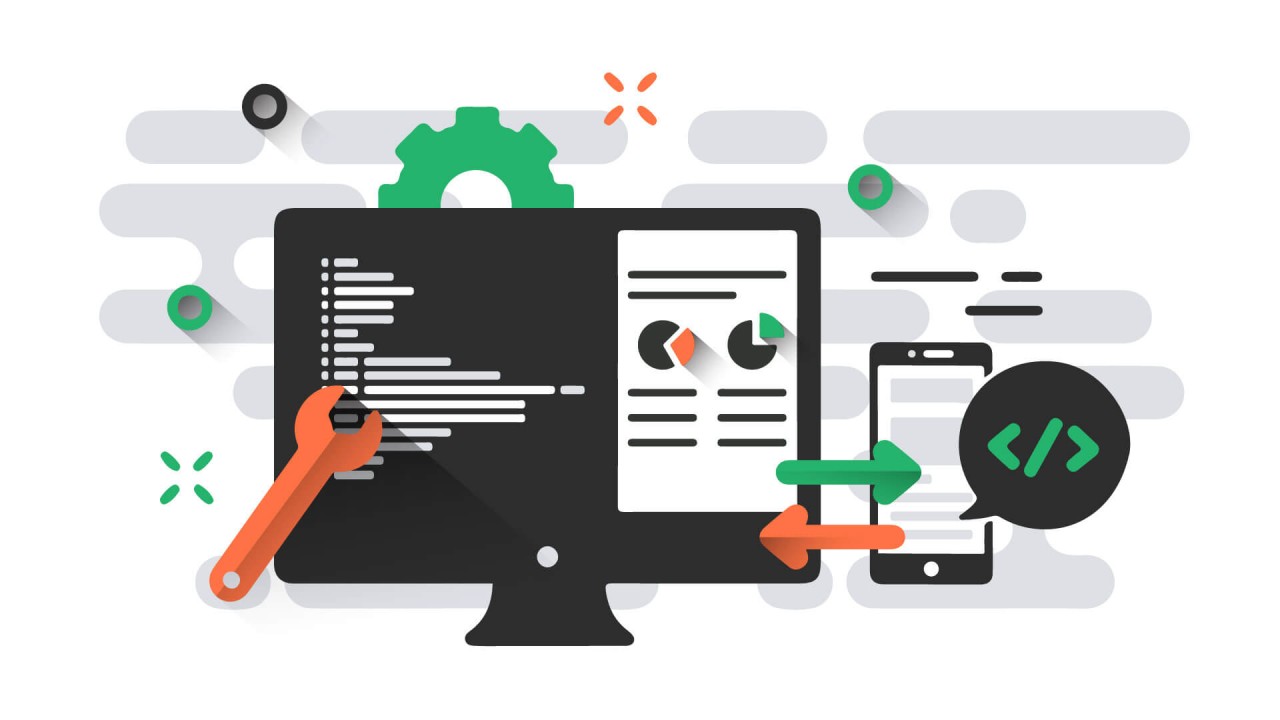Common SEO Mistakes and How to Avoid Them: Expert Tips

Common SEO mistakes include keyword stuffing and ignoring mobile optimization. Avoid these by focusing on quality content and responsive design.
SEO errors can hinder your website’s search engine ranking. Keyword stuffing, poor mobile optimization, and neglecting meta descriptions are frequent issues. Avoid these pitfalls by prioritizing quality content, ensuring your website is mobile-friendly, and optimizing meta descriptions. Regularly updating your content and using analytics tools can also improve your SEO strategy.
Remember, user experience should always come first. By addressing these common mistakes, you can enhance your website’s visibility and attract more organic traffic. Stay informed about SEO best practices to maintain a competitive edge in the digital landscape.

Credit: www.smartsites.com
Introduction To Seo Mistakes
Understanding SEO mistakes is crucial for a successful online presence. Mistakes can hurt your site’s ranking. Learning how to avoid them helps improve your website’s performance.
Importance Of Seo
SEO stands for Search Engine Optimization. It helps your website rank higher on search engines. A higher rank means more visitors to your site. This can lead to more customers and sales.
Good SEO practices make your site user-friendly. They help search engines understand your content. This boosts your site’s visibility and relevance. Ignoring SEO can lead to poor website performance and low traffic.
Common Pitfalls
Many people make mistakes in their SEO strategy. These mistakes can be costly. Here are some common pitfalls:
- Using the wrong keywords
- Creating low-quality content
- Not optimizing for mobile devices
- Ignoring meta descriptions and title tags
- Having broken links on your site
Keywords are crucial for SEO. Using the wrong ones can hurt your ranking. Always research and use relevant keywords.
Content quality matters for SEO. Low-quality content drives visitors away. Create engaging and informative content to keep visitors on your site.
Mobile optimization is essential. Many users browse on mobile devices. Ensure your site is mobile-friendly to improve user experience.
Meta descriptions and title tags are important. They help search engines understand your content. Ignoring them can lower your ranking.
Broken links can frustrate users. They lead to poor user experience. Regularly check and fix broken links on your site.
Keyword Research Errors
Keyword research is crucial for SEO success. Many website owners make mistakes in this area. These errors can harm your rankings and reduce traffic. Below, we will discuss common keyword research errors and how to avoid them.
Ignoring Search Intent
Understanding search intent is vital. Search intent is the reason behind a user’s search query. If you ignore search intent, your content may not match what users need. Users could leave your site quickly, increasing your bounce rate.
To avoid this mistake, always consider what users want. Use tools like Google Search Console to understand user behavior. Create content that matches their needs. This will keep users on your site longer.
Overusing Keywords
Overusing keywords is also known as keyword stuffing. This practice can hurt your SEO. Search engines may see it as spammy behavior. Your content can become unreadable, driving users away.
To avoid keyword stuffing, use keywords naturally. Focus on high-quality content. Aim for a keyword density of around 1-2%. Use synonyms and related words to keep the content engaging.
- Write naturally.
- Use keywords sparingly.
- Focus on user experience.
By avoiding these mistakes, you can improve your SEO. Proper keyword research helps you attract and retain users.
Content Quality Issues
Content quality issues can significantly impact your website’s search engine rankings. High-quality content not only attracts visitors but also keeps them engaged. Here, we will discuss two common content quality issues: duplicate content and thin content. Understanding these issues and knowing how to avoid them can improve your SEO performance.
Duplicate Content
Duplicate content refers to blocks of content that appear on multiple pages. Search engines struggle to decide which page to rank higher. This can dilute your ranking power and confuse users. To avoid duplicate content issues, follow these steps:
- Use canonical tags to signal the preferred version of a page.
- Ensure URLs are consistent across your site.
- Avoid copying content from other websites.
Check your site for duplicate content using tools like Siteliner or Copyscape. Regular audits can help maintain content quality.
Thin Content
Thin content refers to pages with little or no meaningful information. These pages provide a poor user experience and can harm your SEO. To avoid thin content issues, consider these tips:
- Write in-depth articles that cover topics comprehensively.
- Ensure each page has at least 300 words of unique, valuable content.
- Incorporate multimedia like images and videos to enrich the content.
Use tools like SEMrush or Ahrefs to identify thin content. Regularly update your content to keep it fresh and relevant.
| Issue | Solution |
|---|---|
| Duplicate Content | Use canonical tags, consistent URLs, and avoid copying. |
| Thin Content | Write in-depth articles, ensure 300+ words, use multimedia. |
Technical Seo Problems
Technical SEO problems can negatively impact your website’s search engine ranking. These issues often go unnoticed but can significantly affect user experience and page performance. Below, we will discuss two common technical SEO problems: slow page load speed and broken links.
Slow Page Load Speed
Slow page load speed is a major issue. Users expect web pages to load quickly. If your site takes too long, visitors may leave.
| Problem | Impact | Solution |
|---|---|---|
| Large images | Slower load times | Optimize images |
| Unminified CSS/JS files | Longer rendering time | Minify CSS/JS files |
| Server issues | Increased load time | Upgrade server |
Use tools like Google PageSpeed Insights. This tool helps identify and fix slow load speed issues.
Broken Links
Broken links can frustrate users and harm SEO. These links lead to dead ends, causing a poor user experience.
- Broken internal links
- Broken external links
Identify broken links using tools like Screaming Frog. Fix or remove these broken links immediately.
To avoid broken links:
- Regularly audit your site.
- Update outdated links.
- Check links before posting.
Keeping your links in check ensures a better user experience. It also improves your SEO performance.
On-page Seo Mistakes
On-page SEO is crucial for your website’s success. Many website owners make simple mistakes. These mistakes can harm your search engine rankings. Here, we will discuss common on-page SEO mistakes. We will also show you how to avoid them.
Missing Meta Descriptions
Meta descriptions are short summaries of your webpage. They appear in search results. Many people forget to add meta descriptions. Missing meta descriptions can harm your click-through rate (CTR).
Why Meta Descriptions Matter:
- They give a brief overview of your content.
- They help search engines understand your page.
- They improve your CTR.
How to Avoid This Mistake:
- Write a unique meta description for each page.
- Keep it under 160 characters.
- Include your main keyword.
- Make it engaging to attract clicks.
Improper Header Tags
Header tags (H1, H2, H3, etc.) structure your content. They are important for SEO. Many people misuse header tags. This can confuse search engines and users.
Why Header Tags Matter:
- They help search engines understand your content.
- They make your content easier to read.
- They improve user experience.
How to Avoid This Mistake:
- Use one H1 tag per page. It should be the main title.
- Use H2 tags for main sections.
- Use H3 tags for sub-sections.
- Include keywords in your header tags.
By avoiding these common on-page SEO mistakes, you can improve your website’s rankings. This will lead to more traffic and better user experience.

Credit: www.oriondigital.in
Off-page Seo Missteps
Off-page SEO is crucial for your website’s success. It involves activities outside your site that impact your ranking. Common mistakes can hinder your efforts. Avoid these missteps to boost your site’s performance.
Poor Backlink Strategy
A strong backlink strategy is vital for SEO. Many rely on low-quality backlinks. These links come from irrelevant or spammy sites. Search engines penalize such practices. Focus on earning high-quality backlinks. Collaborate with reputable sites in your niche. Guest blogging can help. Use social media to share valuable content. This attracts organic backlinks.
| Good Backlinks | Bad Backlinks |
|---|---|
| From authority websites | From spammy websites |
| Relevant to your niche | Irrelevant to your niche |
| Earned naturally | Bought or exchanged |
Ignoring Social Signals
Social signals play a role in SEO. They indicate your content’s popularity. Many neglect social media engagement. This can harm your SEO efforts. Engage with your audience on social platforms. Share your content widely. Encourage likes, shares, and comments. These actions show search engines your content’s value.
- Post regularly on social media.
- Engage with your followers.
- Share content that adds value.
Ignoring social signals is a common mistake. Correct it by being active on social media. Use platforms that suit your audience. Monitor your social metrics. Adjust your strategy based on engagement levels.
Mobile Optimization Flaws
Mobile optimization is crucial for SEO success. Many websites fail due to mobile optimization flaws. These flaws can lead to high bounce rates and poor user experience. Let’s explore common mobile optimization mistakes and how to avoid them.
Non-responsive Design
A non-responsive design doesn’t adjust to different screen sizes. This makes it hard for mobile users to navigate your site. Ensure your website uses a responsive design. A responsive design adapts to various devices. This improves user experience and boosts SEO rankings.
To check if your site is responsive, use Google’s Mobile-Friendly Test tool. This tool analyzes your website’s responsiveness. Fix any issues it identifies to improve mobile usability.
Slow Mobile Load Times
Slow mobile load times can frustrate users. This can lead to higher bounce rates. Use tools like Google PageSpeed Insights to measure your site’s load time. Aim for a load time of under 3 seconds. Here are some tips to improve load times:
- Compress images to reduce file sizes.
- Minimize the use of heavy scripts and plugins.
- Use a Content Delivery Network (CDN) to speed up content delivery.
Optimizing mobile load times enhances user satisfaction. This will improve your site’s SEO performance.
| Issue | Solution |
|---|---|
| Non-Responsive Design | Use a responsive design template |
| Slow Mobile Load Times | Compress images, minimize scripts, use a CDN |

Credit: www.linkedin.com
Monitoring And Analytics
Effective SEO strategies require consistent monitoring and analytics. This ensures your website remains optimized. Regular checks and data analysis help identify and correct issues promptly. Below, we discuss common SEO mistakes related to monitoring and analytics. Learn how to avoid these pitfalls to maintain your site’s performance.
Neglecting Regular Audits
Failing to conduct regular SEO audits can harm your website’s rankings. Regular audits help identify technical issues and content gaps. Without audits, these problems can linger unnoticed.
Consider scheduling monthly or quarterly SEO audits. Use tools like Google Search Console and Screaming Frog. These tools can help uncover issues like:
- Broken links
- Duplicate content
- Slow page load times
Addressing these issues promptly can improve your site’s health and rankings. Regular audits also ensure your site complies with the latest SEO guidelines.
Ignoring Analytics Data
Ignoring analytics data is a common mistake. Analytics provide valuable insights into your website’s performance. Google Analytics is a powerful tool for this purpose.
Here are some key metrics to monitor:
| Metric | Importance |
|---|---|
| Organic Traffic | Shows the number of visitors from search engines. |
| Bounce Rate | Indicates the percentage of visitors leaving your site quickly. |
| Conversion Rate | Measures the percentage of visitors completing desired actions. |
Regularly reviewing these metrics can reveal trends and areas for improvement. Ignoring this data means missing out on opportunities to optimize your site further.
In summary, consistent monitoring and analysis are crucial for effective SEO. Avoid neglecting regular audits and ignoring analytics data. These practices ensure your website remains in top shape and continues to perform well.
Expert Tips For Success
SEO is crucial for online success. Avoiding common mistakes can boost your rankings. This section offers expert tips to ensure your SEO strategy is effective. These tips will help you stay ahead of the competition.
Staying Updated With Trends
SEO trends change rapidly. Staying updated is essential for maintaining a strong online presence. Follow these tips to keep up with the latest trends:
- Subscribe to Industry Blogs: Follow leading SEO blogs for the latest updates.
- Attend Webinars and Conferences: Learn from experts and network with peers.
- Join SEO Forums: Participate in discussions and get advice from experienced SEOs.
- Follow Google Updates: Stay informed about algorithm changes and best practices.
Using The Right Tools
Using the right tools can streamline your SEO efforts. Here are some essential tools every SEO expert should use:
| Tool | Purpose |
|---|---|
| Google Analytics | Track website traffic and user behavior. |
| Google Search Console | Monitor site performance and fix issues. |
| Ahrefs | Analyze backlinks and competitor strategies. |
| SEMrush | Conduct keyword research and track rankings. |
| Yoast SEO | Optimize on-page SEO for WordPress sites. |
Incorporating these tools into your workflow can save time and improve results. Always choose tools that fit your specific needs.
Staying updated with trends and using the right tools are crucial for SEO success. Implement these expert tips to enhance your strategy and achieve better rankings.
Frequently Asked Questions
What Are Common Seo Mistakes To Avoid?
Common SEO mistakes include keyword stuffing, ignoring meta tags, and poor-quality backlinks. These errors can harm your search rankings and user experience.
How Does Keyword Stuffing Affect Seo?
Keyword stuffing makes your content look spammy. It reduces readability and can lead to penalties from search engines, harming your rankings.
Why Are Meta Tags Important For Seo?
Meta tags help search engines understand your content. Ignoring them can lead to poor indexing and lower search rankings. Always include relevant meta tags.
How Can Poor-quality Backlinks Harm Seo?
Poor-quality backlinks can lead to penalties from search engines. They signal that your site may be unreliable or spammy. Aim for high-quality, relevant backlinks.
Conclusion
Avoiding common SEO mistakes can significantly boost your website’s performance. Focus on quality content, proper keyword usage, and mobile optimization. Regularly update your website to keep it fresh and engaging. By following these tips, you can improve your search engine rankings and attract more visitors.
Stay proactive and watch your online presence grow.









